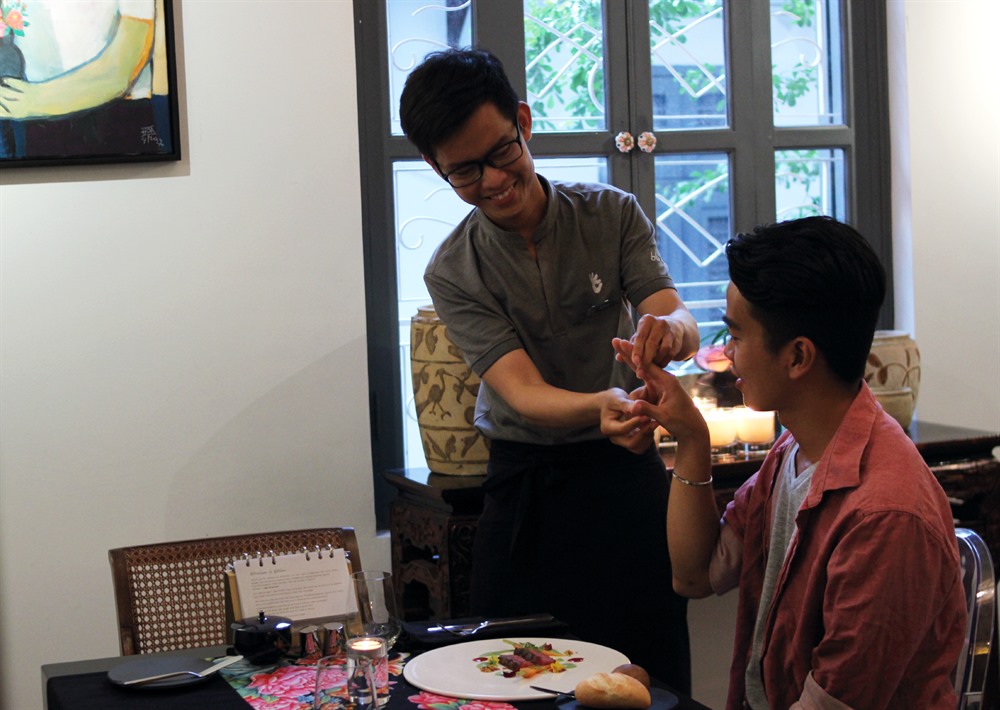Restaurant jobs now an option for workers with disabilities
At Noir, guests dine in the dark, while at Blanc, they use sing language printed on their menus to place their orders with servers.

An employee at Blanc restaurant in HCM City helps a guest use sign language. — Photo courtesy of Blanc restaurant
HCM CITY — At Noir, guests dine in the dark, while at Blanc, they use sign language printed on their menus to place their orders with servers.
Both restaurants, owned by a Vietnamese and Dutch duo, have been offering a “journey of the senses” in HCM City for several years.
At Noir, guests enter a dark space where they focus on their senses of smell, taste and touch, and at Blanc, they communicate in a new form that gives them a deeper understanding about the capacity and skills of their servers, Vũ Anh Tú, co-founder of the two restaurants, said.
“When people come, they can change their mindset (about people with disabilities). Companies or employers who have job openings may even consider hiring someone like them,” Tú said.
Tú, who gave up high-level positions at large companies, and his partner, Germ Doornbos from Holland, said they decided to set up Noir after seeing similar restaurants in other countries.
“We were a bit worried about finding sight-impaired people to serve at Noir,” Tú said. But after meeting candidates and seeing their skills, their concerns disappeared.
“Our talks helped them change their outlook, and they inspired us, too,” he added.
Since Noir’s opening in 2014, and after an initial period of training, many servers have gone on to excel at their jobs, even picking up language skills in English and Japanese while working. Some can now speak quite well, Tú said.
Noir’s success encouraged the two partners to open Blanc in 2017 with servers who are hearing-impaired.
“Their largest barrier was language, so training was not that easy,” Tú said, adding that the restaurant has also been successful.
“We do not want guests to think they are coming for charity only. We don’t want to see this kind of pity from guests.”
Tú and Germ are also concerned about the quality of the food, which is praised by diners.
The restaurants do not depend on donations and have to earn a profit to pay for salaries and other expenses, according to Tú.
The profits are reinvested in the two restaurants and other kinds of future services such as massage and flowers shops that will also use sight- or hearing-impaired employees.
The two partners want to send a message through their business model that people with disabilities are capable of working, especially when employers offer them a job suited to their skills and a good working environment.
“That is the social value that we want to convey. When society sees them working in many different sectors, there will no longer be discrimination,” Tú said. “Nearly 90 per cent of sight-impaired people do not have jobs. The rate for hearing-impaired people is around 65 per cent.”
Popularity
Noir is so popular that it is ranked in HCM City’s top five fine-dining restaurants on TripAdvisor’s website.
Many foreign tourists, who have learned about the restaurant through “word of mouth” say the food and service are both excellent, and the staff kind and sweet. Both restaurants employ experienced Vietnamese chefs.
The two restaurants were honoured as one of the top 100 creative social enterprises in the “Social Venture Challenge Asia” contest in Singapore and one of the top four in the “Remake the City Hà Nội- HCM City” competition in Việt Nam.
Their high social impact and business indexes have led many social enterprises to invite them to talk about their model.
International schools in Việt Nam and universities in other countries have also sent their students to the restaurants to learn about their operations
“We hope our business model inspires others to establish companies that employ more people with disabilities. Our model’s core value is to create jobs for sight- or hearing-impaired people. ‘Slowly but surely’ is what we aim to do,” Tú said.
In the near future, Tú and Germ plan to develop massage services offered by the blind. Although such services already exist, the two partners want to focus on offering a professional, highly skilled massage with positive sensory experiences. — VNS
Cre: vietnamnews.vn




 0933022626
0933022626




Comment